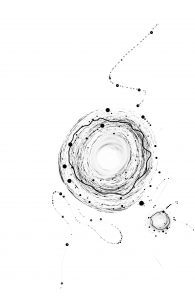
“Escaping the Darkness” by Emanuela Lorga
The Children’s Orchestra
Joanna Theiss
At sixteen, Annie is as tall as a ¾ upright bass. She is as lean as a bow, her nose as straight and sharp as a staff. She has not seen her father in more than a year, so long that when she thinks of him, she does not see a person at all but a bloodless, angular statue poured from bronze.
The house is Annie’s now—its swirls of modernist paintings, its grand piano, its chrome and glass kitchen, and its refrigerator that greets her every morning with a monotone, “Good Morning, Annie.”
Annie practices for an hour before school and three hours after, and the second chair picks her up on Saturdays for orchestra. When she cannot sleep, Annie tucks herself between the wall and her father’s filing cabinet, eating seaweed salt chips with her right hand while practicing fingering with her left.
In October, Annie is writing her essay for early admission to the music conservatory when the phone rings.
Her father is getting married in Puerto Rico.
*
Annie did not know that she had any other family, but poolside at the resort in San Juan, she discovers a blossoming, budding aunt with eggplant breasts and a canola oil tan, her womanhood waving like a nursing bra on a washing line.
Though Annie did not know about this aunt, the aunt knows all about Annie because she has seen videos of Annie’s performances: Annie as an erect and serious eight year old in the Children’s Orchestra, Annie soloing at the concert hall where Isaac Stern once played.
“When your mom left, I worried about how your dad was going to do it. But then I saw how incredible you were at the violin, and I figured, wasn’t that proof that he’d gotten his act together?”
The sun thrums on the surface of the pool. Annie strokes her biggest callous, the one on her middle finger, listening to the aunt’s relentless presentation of this out-of-tune version of her childhood. When the aunt compliments the model who has become Annie’s stepmother, the tears fall across Annie’s face in scales.
“Oh, bunny,” the aunt whispers. “I had no idea that you were being neglected.”
Annie has not been neglected. There is her violin—a constant—and feeding her and dressing her in the black skirts and scoop neck blouses she needs for concerts. Besides, only children can be neglected, and Annie is practically an adult.
Annie means to say all of this, but her emotional adagio has sucked her dry.
*
The aunt’s bungalow, on the idle end of a cul-de-sac, is crammed full of rabbits made of ceramic and plastic and tin. A real rabbit—a fawn Angora—blinks at Annie from her hutch, a courtesan dozing on fleece.
In this house, Annie is not a violinist; she is a child. Annie sits criss-cross applesauce in the den while the aunt shows her one of her fragile rabbits, a porcelain antique that is so glisteningly lifelike it almost twitches.
The aunt rubs honeyed oils into Annie’s fingertips to soothe their coarseness. She stands outside the bathroom door, asking Annie if she needs help wiping. She turns off Annie’s alarm clock so that she sleeps through the start of school and hushes her when she complains, murmuring that she couldn’t bear to wake her. She blankets Annie in kisses: Annie is her rainbow baby, her forever angel. When Annie sneaks off to school, the aunt picks her up early, beaming at the sight of her, presenting her with a toy rabbit, the stuffed thing’s purple, sparkling eyes her only hardness.
With the aunt, Annie has no thoughts, just sensations of fatty lotions slicking her belly, of rabbit fur on her inner arms, of super soft sheets smothering her thighs.
If she had thoughts, she might wonder about what she is doing, hours after the aunt’s television programs finish blinking through their credits, while the aunt, sated and nodding, emits a pizzicato of snores. She might wonder why she decides to walk out of the aunt’s dead-end lane, across town, to her father’s house.
Beeps from the security system scold her as she opens the front door. The marble is icy on the hot balls of her feet. In the living room, Annie’s music stand waits with steel expectancy, the book open to a minuet in the key of disappointment at Annie’s neglect.
On the floor, Annie’s violin is waiting for her like a pearl in a shell of rigid black plastic. The case is heavier than she remembers, but when she unclicks the clasps and lifts her instrument, it slides into position below her chin, as natural as a parent’s love.
Joanna Theiss (she/her) is a freelance author living in Washington, DC. She writes creative nonfiction, book reviews, and short fiction. Twitter: @JoannaVTheiss
